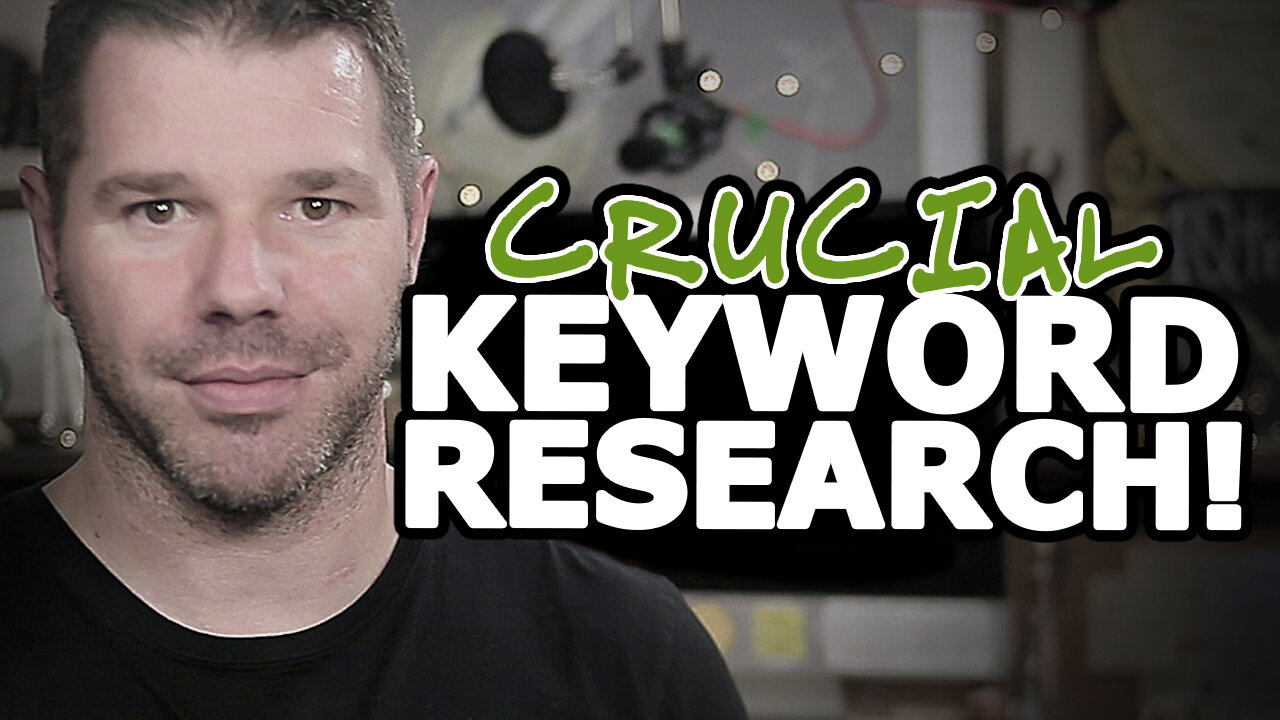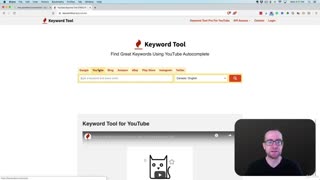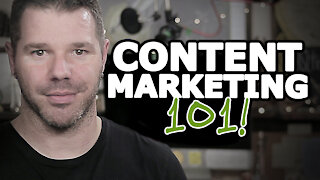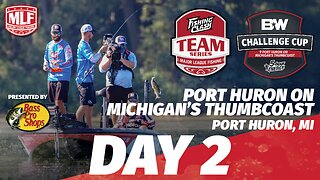Premium Only Content

Why Keyword Research Is SO IMPORTANT In SEO (Do It RIGHT!) @TenTonOnline
From zero to profitable online business in just 7 simple steps! Download your FREE Online Business Jumpstart guide: https://www.tentononline.com/jump
"Escape the grind, build a fulfilling online business, and launch a better tomorrow!"
--------------------------------------------------
Show Notes:
- Online business guide (free download!): 7 Steps To Profits! https://www.tentononline.com/7-steps-to-profits/
- Domain registration: https://10tn.tips/domain
- Solid web hosting (with discount!): https://10tn.tips/hosting
- Business-grade email: https://10tn.tips/email
- Best email marketing service: https://10tn.tips/email-marketing
- Best website builder: https://10tn.tips/web-builder
- Top web and marketing tools and services: https://10tn.tips/tools
Support my work (thanks!):
- https://10tn.tips/boost
--------------------------------------------------
Transcription:
why keyword research is so important in seo
The worst way to begin your SEO efforts is to sit at your computer, or sit in a coffee shop, and start thinking and listing out all the keywords you'd like to target...and then working hard and creating content and pages to target what THINK people are searching for.
With this approach, you're guessing. You're shooting in the dark and guessing what you think your audience might be searching for. Instead of guessing, keyword research is all about finding out what EXACT words and phrases the people you seek to attract are ACTUALLY using when they're searching online.
Keyword research reduces and even eliminates risk. It removes the gamble. It eliminates guesswork. You can just start throwing your ideas against the wall and hope that something sticks, or you can be strategic and create content based on keywords you KNOW people are already using when they search.
So, you want to purposefully target keywords you KNOW your audience and customers are using when they search. After all, the people you seek to attract are already out there, searching with specific keywords and following search result links every day.
Your SEO strategy is about creating content that purposefully targets keywords they're using...with the hopes of ranking well for those keywords and therefore getting your content in front of them. So, no guessing. No theorizing. No shooting in the dark. It's very simple: You have a website and you want traffic.
People search on Google for answers to their problems. To make a connection between what you want (traffic) and what they want (a solution to their problem) you have to know what they're searching for. So, you HAVE to use the keywords that your prospects are using.
If you don't know what keywords your prospects are using, you can't connect with them and they can't find you. It's important to note too that purposefully targeting keywords isn't precise.
If you create a page or a post on your website that targets a specific keyword, that page will also rank for other related keyword phrases. This is called Latent Semantic Indexing.
All this means is that your content will likely rank not only for keyword phrases you're targeting, but also for related keywords -- words and phrases you aren't intentionally targeting. Here's an example: Try searching for "Is it hard to learn HTML?"
When I did this a while ago, the #1 result was "How Hard Is JavaScript to Learn? HTML Comparison." So Google thinks JavaScript is the same, or VERY similar, to HTML. So you know what I did?
I wrote more accurate content and grabbed the top spot, the #1 ranking in Google, for the search phrase "Is it hard to learn HTML?" with an article called "Is HTML Easy To Learn." I also nailed the #2 spot with an article titled "How Hard Is It To Learn HTML Code?"
I'm certainly not bragging here...this is just an example of how Google thought HTML and JavaScript were very similar...until someone (me!) came along and published more accurate content. And note too that both of my top ranking articles aren't titled exactly as "Is it hard to learn HTML?"
So again, targeting keywords isn't precise. Instead, think of targeting keywords as being "your best shot," or "improving your odds of ranking well."
If you're going to go to all the hard work and effort of building your online business, your website, and creating great content to attract and build your audience...then give yourself the best chances of getting found by your audience by targeting the keyword phrases they actually use.
--------------------------------------------------
TONS more at https://www.tentononline.com/blog
-
 16:01
16:01
Ten Ton Online
1 year ago"Why Is Marketing And Sales Important?" (Struggling? You're Missing THIS) - Fast & EASY Fix
87 -
 14:03
14:03
YouTube Video Ads Academy The Definitive YouTube Ad Course
3 years ago $0.14 earnedKeyword Research
1.01K -
 3:12
3:12
Ten Ton Online
3 years agoWhy Market Research Is So Important (BIG Mistake To Skip It!) @TenTonOnline
28 -
 5:41
5:41
Ten Ton Online
3 years agoImportant Parts Of A Business Website (SIMPLIFIED!) @TenTonOnline
45 -
 4:49
4:49
Ten Ton Online
3 years agoMost Important Email Marketing Metrics REVEALED! @TenTonOnline
123 -
 3:28
3:28
Ten Ton Online
3 years agoContent Marketing Research - Key To Attracting Eyeballs! @TenTonOnline
74 -
 4:46
4:46
Ten Ton Online
3 years agoConduct A Market Survey - Crucial Importance Of RESEARCH! @TenTonOnline
16 -
 3:45
3:45
Ten Ton Online
3 years agoKnow What Customers Want - Market Research Requirements! @TenTonOnline
23 -
 5:30
5:30
Ten Ton Online
3 years agoWhy Content Is Important In Marketing - Delve Into The Details! @TenTonOnline
18 -
 UPCOMING
UPCOMING
Major League Fishing
3 days agoLIVE! - Fishing Clash Team Series: Challenge Cup - Day 2
500